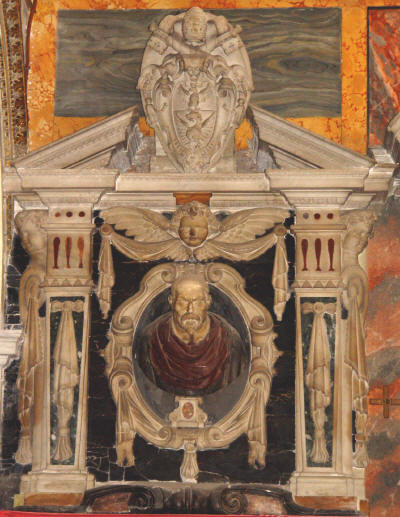
Cenotaph in
memory of Prospero Farinacci (1544-1618), attributed to Domenico Fontana
(1543-1607), in the Church of S. Silvestro al Quirinale in Rome. Farinacci
had been appointed counsel of the Sacra Consulta by Pope Clemente VIII
Aldobrandini (1592-1605) and Procuratore fiscale of the Apostolic Camera
by Pope Paul V.
In 1595 Farinacci was living the the
Palazzo Altemps home of Cardinal Marco Sittico Altemps. Berardino
Rocchi.
Pope Clement VIII: "La farina
è buona. È il sacco che è cattivo." |
Jurisprudence Governing the Use of Torture
1. Evidence must be legitimate,
probable, grave, and sufficient --- the judge must be almost certain of
guilt
2. Even with his
"absolute power," prince may not mandate torture without sufficient proofs
--- if judges obey princely orders to torture without sufficient
proofs they will be brought to trial for their crime
3. If a judge threatens
a defendant with torture --- that is torture
4. Before ordering
someone to be tortured a judge must set a term for defendants to
make their defense and provide them with the accusations and evidence
against them
5. When the proofs are
sufficient a defendant should be convicted and not tortured
6. Many persons are
exempted from torture: nobles, pregnant women, minors. The prince
may grant permission to order the torture of a noble person |